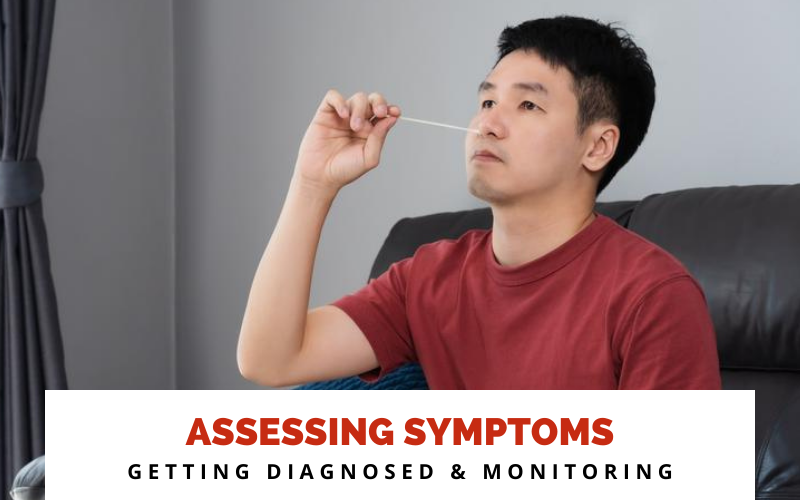Managing chronic conditions
when you have COVID-19
While having a chronic health condition can increase your risk of developing severe COVID-19 symptoms, the reverse can also be true. While your immune system is busy fighting the virus, other systems in your body can be adversely affected.
For example, even if you don’t have diabetes, your blood sugar levels can rise significantly. COVID-19 can also lead to increased heart, lung or other organ disease complications.
Contact your treating doctors for specific information on how to manage your treatments for your chronic conditions. For example, should you stop, alter or continue your usual medications? Will COVID-19 treatments affect how you use your current medications (especially if you already take corticosteroids or medications such as baricitinib?
People on immunosuppressant medications for conditions such as autoimmune arthritis or lupus sometimes need to come off these medications prior to surgery or when fighting severe infections. However, doing so can lead to flares of disease activity.
Therefore, the Australian Rheumatology Association (ARA) recommends people on these medications do not stop their treatment without first consulting their rheumatologist as decisions to pause or continue treatment should be made on a case-by-case basis.
The following websites have more information about managing medications for chronic conditions when you also have COVID-19.
- Australian Rheumatology Association: Practical Tips for Patients with AIRD in the COVID-19 Pandemic
- RACGP: Diabetes management during the coronavirus pandemic: Be proactive and prepared
- NPS MedicineWise: Using your medicines during the COVID-19 pandemic
- NPS MedicineWise: I have asthma, what does COVID-19 mean for me?
You should also contact any other members of your healthcare team who play a role in your regular care. For example, you might wish to continue having telehealth appointments with your dietician, physiotherapist or psychologist.
If you have had any COVID-19 symptoms, your recovery time can vary from days to many weeks. This may depend on your general health, your age, the severity of your symptoms and other factors so it will be different for everyone.
In general, you will generally be considered to be recovered if you have not had any symptoms (or any new symptoms) for seven consecutive days.
Some people may continue to experience symptoms for many months. If symptoms cannot be explained by a different diagnosis this is referred to as long COVID or post COVID-19 condition. Even if you only had mild symptoms and were not admitted to hospital, you can still develop long COVID. Symptoms may appear and disappear at different times.
Long COVID has no specific treatment but your GP and other healthcare professionals can help you manage your symptoms.
There is no specific treatment for this condition. Any person who develops post COVID-19 condition should seek care.
See the following websites for more information on recovering from COVID-19 and managing long COVID
- healthdirect: Recovering from COVID-19.
- Royal Australian College of General Practitioners: Managing common post-COVID-19 symptoms at home
Australian Government Department of Health: COVID-19 Vaccinations: Long term effects of COVID-19
Australian Government Department of Health Coronavirus (COVID-19) Pandemic, Risk factors for more serious illness, https://www.health.gov.au/health-alerts/covid-19/advice-for-groups-at-risk/risk-factors-for-more-serious-illness
Diabetes Queensland, Can COVID-19 trigger diabetes?, https://www.diabetesqld.org.au/news/can-covid-19-trigger-diabetes/
Heart Foundation, COVID-19 and cardiovascular disease, https://www.heartfoundation.org.au/covid-19/covid-19-and-heart-disease-risks
Lung Foundation Australia, COVID-19, What you need to know, Managing your condition, https://lungfoundation.com.au/lung-health/protecting-your-lungs/coronavirus-disease-covid-19/medication/
Australian Rheumatology Association, Practical Tips for Patients with AIRD in the COVID-19 Pandemic, https://rheumatology.org.au/For-Patients/COVID-Information/COVID-Practical-Tips-for-Patients
Royal Australian College of General Practitioners (RACGP), Diabetes management during the coronavirus pandemic: Be proactive and prepared, https://www.racgp.org.au/getmedia/97a5abb4-1290-42cb-91c0-eabcaa8ca590/Diabetes-management-during-coronavirus-pandemic_1.pdf.aspx
NPS MedicineWise, Using your medicines during the COVID-19 pandemic, https://www.nps.org.au/medicines-and-covid-19
NPS MedicineWise, I have asthma, what does COVID-19 mean for me?, https://www.nps.org.au/covid-19-and-medicines-faqs#asthma
healthdirect, Recovering from COVID-19, https://www.healthdirect.gov.au/managing-covid-19/recovering-from-covid-19
Royal Australian College of General Practitioners (RACGP), Managing common post-COVID-19 symptoms at home, https://www.racgp.org.au/clinical-resources/covid-19-resources/patient-resources/patient-resource-managing-post-covid-19-symptoms
- Australian Government Department of Health, COVID-19 Vaccinations, Long term effects of COVID-19, https://www.health.gov.au/sites/default/files/documents/2021/08/covid-19-vaccination-long-term-effects-of-covid-19.pdf
Australian Government health information
-
National Coronavirus Helpline: 1800 020 080 — 24 hours a day, 7 days a week. Select option 5 for interpreter services.
-
Australian Government Department of Health Coronavirus (COVID-19) Pandemic:
If your symptoms become life-threatening, you should call triple zero (000) for an ambulance and tell the ambulance staff that you have COVID-19.
State and territory health departments
Other resources
-
Beyond Blue: Coronavirus Mental Wellbeing Support Service 1800 512 348


